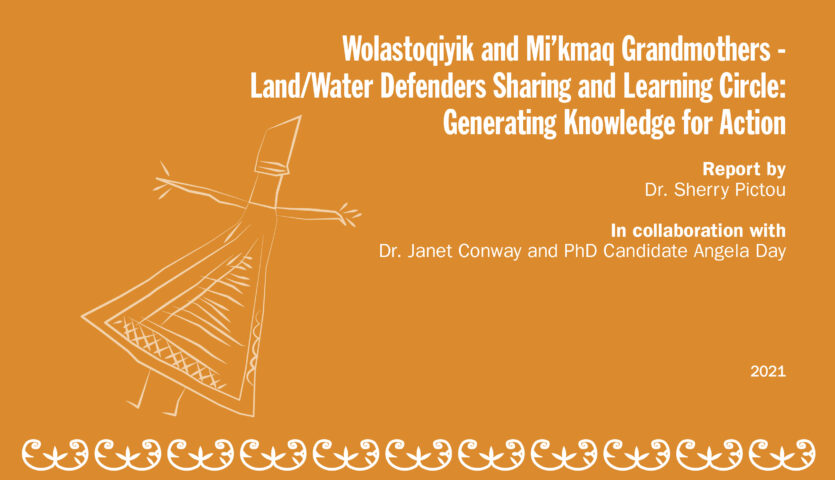Grandmothers report exposes a pattern of normalized harm and discrimination against indigenous peoples in push for environmental approval of large development projects, says new report released on Sept. 28.
New research into the way New Brunswick and Nova Scotia handles consultations with Indigenous communities on development projects reveals ongoing systemic discrimination and harm against Indigenous land defenders in Atlantic Canada.
Released just two days before Canada’s first National Day of Truth and Reconciliation, the report, Wolastoqiyik and Mi’kmaq Grandmothers – Land/Water Defenders Sharing and Learning Circle: Generating Knowledge for Action Report, paints a dark picture of how the government and industry’s addiction to large-scale energy and mining projects as easy and convenient engines of economic growth are actively harming and discriminating against our most vulnerable (local land defenders), who lack the political or economic power to offset corporate and government interests.
Given to us in first-person accounts by Wolastoqiyik Grandmother/Defenders against the Sisson Mine in New Brunswick and Mi’kmaq Grandmothers against the Alton Gas project in Nova Scotia, the Grandmothers’ Report offers unique insight into how governments and corporations use formal agreements limited only to the Chiefs and Councils (as prescribed by the Indian Act) to ignore the concerns of local stakeholders and grassroot organisations.
This creates the bureaucratic illusion of Indigenous consent for large industrial projects, argues the Grandmothers report.
“They take our words (politicians) as rights holders and distort or co-opt them,” says one of the Wolastoqew Grandmothers/Defenders who had their story recorded.
The report further alleges that governments and corporations collude to advance development using various forms of coercion, such as having police intimidate and physically assault Indigenous land defenders.
These findings echo those made by the final report on the National Inquiry into Missing and Murdered Indigenous Women and Girls released in 2019, and provide a clear window into the government’s discriminatory approach to decision-making on Indigenous issues.
“Their land defense efforts are met with injunctions; Indigenous land defenders are criminalized as public and private security forces are tasked with protecting corporate interests, a violation of Indigenous rights” says Gabriela Jiménez, the Latin America Partnerships Coordinator with KAIROS Canada.
“As Indigenous women land defenders affirm, the federal and provincial governments’ resource development processes and practices are not just lacking but detrimental to people and the planet.”
Standing with the MMIWG Report’s Calls for Extractive and Development Industries, the Grandmothers’ report calls for further research into the process for granting environmental approvals and permits for resource projects to better inform advocates on how those decisions are being made.
The Grandmothers report recommendations also includes: granting personhood rights to river systems; restoring Indigenous governance systems that honour female leadership; and, expanding relationships between Indigenous communities and allies.
“I am truly honored to have played a part in facilitating a sharing-learning circle as a way to create space for Wolastoqiyik and Mi’kmaw Grandmothers/Defenders who like many Indigenous grassroot peoples are excluded from formal consultation processes regarding resource extraction and development,” said Dr. Sherry Pctou, co-author of the Grandmother report, written in collaboration with Dr. Janet Conway and PhD Candidate Angela Day, and in partnership with KAIROS Canada.
“It is a report about their shared stories highlighting the impacts of resource extraction on Indigenous women and their communities as well as their vision on how to address these issues in ways that contribute to the well-being of all our relations (human and non-human) ‘All of our Relations’— M’sit No’kmaq (Mi’kmaw) and Psi-te ntolonapemok (Wolastoqiyik).”
Read the full report: Wolastoqiyik and Mi’kmaq Grandmothers – Land/Water Defenders Sharing and Learning Circle: Generating Knowledge for Action Report.
Watch the Defenders Sharing and Learning Circle: Generating Knowledge for Action videos:

